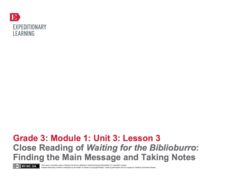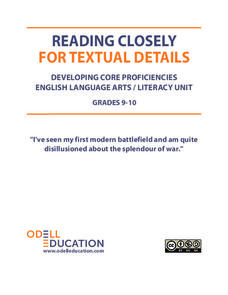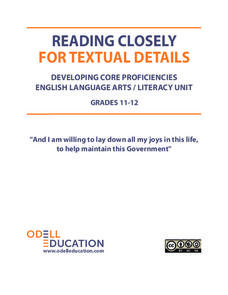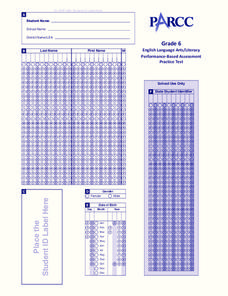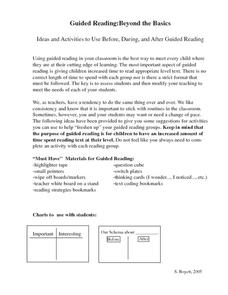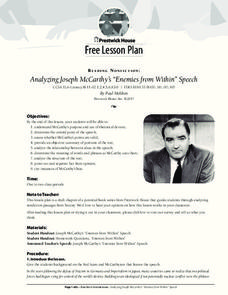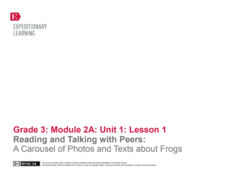Scholastic
Comprehension During Independent Reading
Ideal for a language arts class, literary unit, or independent reading assignment, a set of reading worksheets address a wide array of skills. From poetic elements to nonfiction text features, you can surely find a valuable resource in...
Association for Library Service to Children
Summer Reading List Grades 3-5
Encourage your charges to pick up a book (or two, or three) over the summer! They'll find 25 different ideas on this list of summer reading books for kids. Each book is paired with publication information and a brief synopsis, so your...
Curated OER
Reading Strategies for Decoding Tricky Words
Help primary school pupils learn valuable reading strategies. As they choral read a poster or big book, they predict covered words and learn various reading strategies for figuring out an unknown word. This will help them gain an...
EngageNY
Close Reading of Waiting for the Biblioburro: Finding the Main Message and Taking Notes
Expose your class to Waiting for the Biblioburro, narrative nonfiction that will act as the bridge between ficiton and informational texts to come. Class members do a close reading of the text, looking at excerpts instead of the whole...
Odell Education
Reading Closely for Textual Details: Grades 9-10
Pay close attention! After finding details in a picture, scholars begin to find details in videos and text. They work together in groups, discuss in pairs, and carry out independent reading to answer guiding questions. Organizers, tools,...
Odell Education
Reading Closely for Textual Details: Grades 9-10
Pupils work in small groups to answer guided questions and discuss the details they found. They also read independently, improving strategies they learned to approach and question text.
Lesson Plansos
Guided Reading Activities with Pizzazz
Get the most out of your guided reading lessons with this collection of literacy materials. Offering a system for using color-coded tags to mark pages while reading books, as well as an assortment of comprehension and grammar worksheets,...
Odell Education
Reading Closely for Textual Details: "And I am willing to lay down all my joys in this life..."
Look closely, some details are hidden! Scholars learn how to find attributes by first examining characteristics in illustrations and then move to locating details in text with close reading. The teacher models good practices for...
Curated OER
Mixed Bags: Fiction and Nonfiction
The second in a series of three lessons from Scholastic comparing and contrasting fiction and nonfiction, this activity requires learners to read, write, and compare two books independently. After briefly reviewing the features of...
Curated OER
Nonfiction Sharing Board
In this nonfiction sharing board worksheet, students complete questions about the books main idea, vocabulary, facts, connections. Students also graph information from the book, go beyond the text, and evaluate how they felt about the...
Curated OER
Performance-Based Assessment Practice Test (Grade 6 ELA/Literacy)
Keep an eye on the growth of your sixth graders' reading and writing skills with the help of this practice Common Core assessment. Working their way through the six included fiction and nonfiction reading passages, learners answer a...
National Council of Teachers of English
Timelines and Texts: Motivating Students to Read Nonfiction
With the emphasis on incorporating more nonfiction in language arts classes the question arises about how to design activities that motivate kids to engage with informational text. How about an assignment that asks class members to...
Ideas From Suzi
Guided Reading: Beyond the Basics
Elevate children's reading comprehension skills with this collection of guided reading resources. From paper dice with basic comprehension questions printed on them to a system for using sticky notes to identify key parts of a story,...
Curated OER
What Do You See at the Pond?
With What Do You See at the Pond?, young readers explore pond life and practice reading strategies. Learners first make predictions and then read the simple story independently. After a second read-through with a partner, kids come...
Prestwick House
Reading Nonfiction: Analyzing Joseph McCarthy's "Enemies from Within" Speech
Looking for a instructional activity that teaches class members how to analyze nonfiction? Use Joseph McCarthy's famous "Enemies from Within" speech as a instructional text. Worksheet questions direct readers' attention to the many...
EngageNY
Reading and Talking with Peers: A Carousel of Photos and Texts about Frogs
Frogs are the theme of a lesson plan that challenges scholars to examine photographs, read informational texts, then ask and answer questions. Scholars work collaboratelively as they rotate through stations, discuss their observations,...
Media Smarts
Bias in News Sources
As young consumers of media, it is important for high schoolers to explore concepts of bias and prejudice, and how they may be present in media. After discussing ideological messages that media can contain, individuals complete a warm-up...
International Reading Association
Children’s Choices 2014
Books for kids, chosen by kids! What could be better? This packet is made up of book lists, each with approximately 30 books included, organized by age group. Kids will enjoy the summer reading materials they choose from this resource!
EngageNY
Close Reading of Bullfrog at Magnolia Circle: Main Ideas about the Bullfrog
As your class reaches the end of the book Bullfrog at Magnolia Circle, the seventh instructional activity in this literary unit helps third graders transition from reading narrative to expository writing. Scholars develop their...
EngageNY
Asking and Answering Questions: Reading about a Frog's Habitat
Building upon previous lessons, scholars take to asking and answering questions about a frog's habitat. A partner discussion follows a read-aloud of an informational text in preparation for a worksheet that boosts reading comprehension...
EngageNY
Close Reading: Paragraph 4 of “Refugee and Immigrant Children: A Comparison”
Why is reading a text closely a helpful skill? Using the 13th of 20 lessons from the Grade 8 ELA Module 1, Unit 2 series, scholars continue reading the informational text "Refugee and Immigrant Children: A Comparison." They work with...
EngageNY
Reading for Fluency: Readers Theater about the Rainforest (Page 33)
Lights, camera, action. Scholars use page 33 of The Most Beautiful
Roof in the World to create a readers theater. They work in triads and use sticky notes to mark and create their own speaking parts from sections of the text. They then...
Curated OER
Identifying Features of Nonfiction Text
Learners explore nonfiction text. They identify the cover, title page, and table of contents of a nonfiction book. Pupils work in groups to create a chapter for a nonfiction class book about heroes.
Curated OER
Build Mastery: Purpose for Reading
Do you agree? Set up three stations in your room for this reading comprehension activity: I agree, I disagree, and I'm not sure. Learners listen to statements and walk to the sign that best describes their response. Model this with an...





